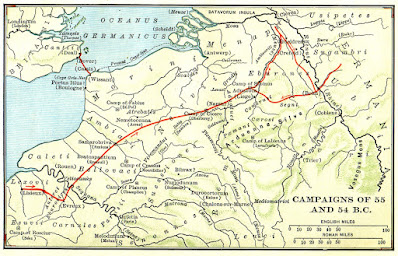Caesar, ubi cōpiās et nāvēs ad portum Itium convocāverat,
omnēs rēs ad bellum Britannicum parāvit. Inde Caesar legiōnēs in octōgintā
nāvibus onerāriīs trānsportāvit : XVIII nāvēs onerāriās equitibus distribuit.
Quīntus Titūrius Sabīnus et Lūcius Aurunculēius Cotta, lēgātī, exercitum
reliquum dūxērunt contrā Morinōs et Menapiōs, quī erant gentēs Gallicae.
Pūblius Sulpicius Rūfus cum praesidiō portum Itium tenēbat. Inde Caesar tertiā
ferē vigiliā ubi tempestās erat idōnea, solvit. Equitēs etiam, quī ad portum
ulteriōrem prōcesserant, nāvēs cōnscendērunt.
praesidium, -ī [2/n] has various meanings depending on
context: [i] protection; defence [ii] assistance [iii] (here) garrison, but can
also refer to a convoy or an escort
solvō, -ere, solvī [3]: [i] loosen; untie [ii] (here) set
sail i.e. loosen the moorings (of a ship)
tempestās, tempestātis [3/f] can mean storm, but also a more
general meaning of “weather”
ulterior, ulterius: further; more remote this is the comparative
form of the adjective, the equivalent of English longer or more
beautiful. This feature of the language will be discussed in detail in later
posts.
____________________
Caesar, when he had summoned troops and ships to the port of
Itius, prepared all things for the British war. Then Caesar transported the
legions in eighty cargo ships: he distributed eighteen cargo ships to the
cavalry. Quintus Titurius Sabinus and Lucius Aurunculius Cotta, as envoys, led
the rest of the army against the Morini and Menapii, who were Gallic tribes.
Publius Sulpicius Rufus held the port of Itius with a garrison. Then, at about
the third watch, when the weather was suitable, Caesar set sail. The horsemen
also, who had proceeded to the further port, boarded the ships.
____________________
Campaign Map of 55 and 54 BC by Towle & Jenks
[3] “tertiā ferē vigiliā”: the night was divided into four
“watches” (vigiliae) from sunset to sunrise
https://adckl.blogspot.com/2024/04/220324-ordinal-numbers-2-telling-time.html
https://dcc.dickinson.edu/caesar/book-4/chapter-4-24
[4] detailed information concerning the role of a legātus
can be found here:
https://www.perseus.tufts.edu/hopper/text?doc=Perseus:text:1999.04.0062:entry=legatus-harpers







